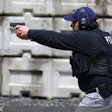My wife and I were having dinner the other night with a friend who happens to be a professional golf instructor (go to the Professional Golfers Association at www.pga.org for his qualification details). He was in a pro match recently and ended up one shot out of the money, which meant he was going to practice some more. He then showed me his newest teaching tool, one he teaches novices with, and said he used it himself to get back in the groove.
All at once it dawned on me: Even a professional practices and returns back to the basics when sharpening up. How could this be like police skills?
When you think about all of the education you have, it's all rooted in the basic skills you acquired in elementary school. The foundation for all of our learning comes from the three R's of knowledge: reading, 'riting, and 'rithmetic. Just like in police skills, it all comes back to the basics.
There's a direct parallel between golfers and cops in that there are far too many who try to buy a low golf score or a higher pistol range score. My friend's clients buy new drivers, while some of us go to the cop shop looking for the newest sights, grips, and new tacticool gizmos thinking they will magically fix our problem. When we do this we are trying to buy a better range score but not focusing on the skills. Just like some golfers, we often talk about all of the cool ways to avoid practice, hoping the latest fad in some magazine will make us the pro we want to be without putting in the work.
Several years ago I was playing golf with another PGA professional in Georgia. Now this guy was a pro's pro; his students were on Sunday afternoon television. I asked him what it takes to make the weekend cut in pro golf. His reply was to hit 10 perfect shots in a row. One woof and start over.
"Great, only 10 shots!" I said.
"No," he told me. "That will be 10 perfect shots in a row with each club. And that includes straight, hook, and cut shots."
"Wait, that could be hundreds of shots," I told him.
He smiled and said, "Yes, and that's something you need to do every day, not once."
The same goes for shooting. On the professional shooting circuit I saw an advertisement stating that one particular shooter shot tens of thousands of rounds per year with that company's ammo. OK, great ad, but that only tells you how many rounds he shoots on the circuit. How many times does he shoot just to practice? Thousands, maybe tens of thousands. That is the reason he is on the pro shooting circuit and gets to go to work there every day. He has the dedication to do that much practice. It is the same with nearly any professional athlete: succeeding requires practice and commitment.
So what is the point here? If you have a bad day at the range, you go back to the basics: sight alignment, grip, breathing, trigger control, and balance. You didn't deliver a stunning strike with the baton? Then you go back to the bag and practice balance, target focus, grip, and a fluid delivery.
The basics are never beneath us, for they are the foundation of all we do. Even in the traditional martial arts, the oldest, most experienced belts are the ones who teach the children. Sure, it makes sense. Who better to learn the basics from than the masters? But think about it. That also means the best of the best spend much of their time going over the basics over and over again to be able to teach them to the newbies. Maybe that's one reason they're so good.
So, having a bad day? Revisit the basics. It is the core foundation of whatever you are doing. See you at the range.

















